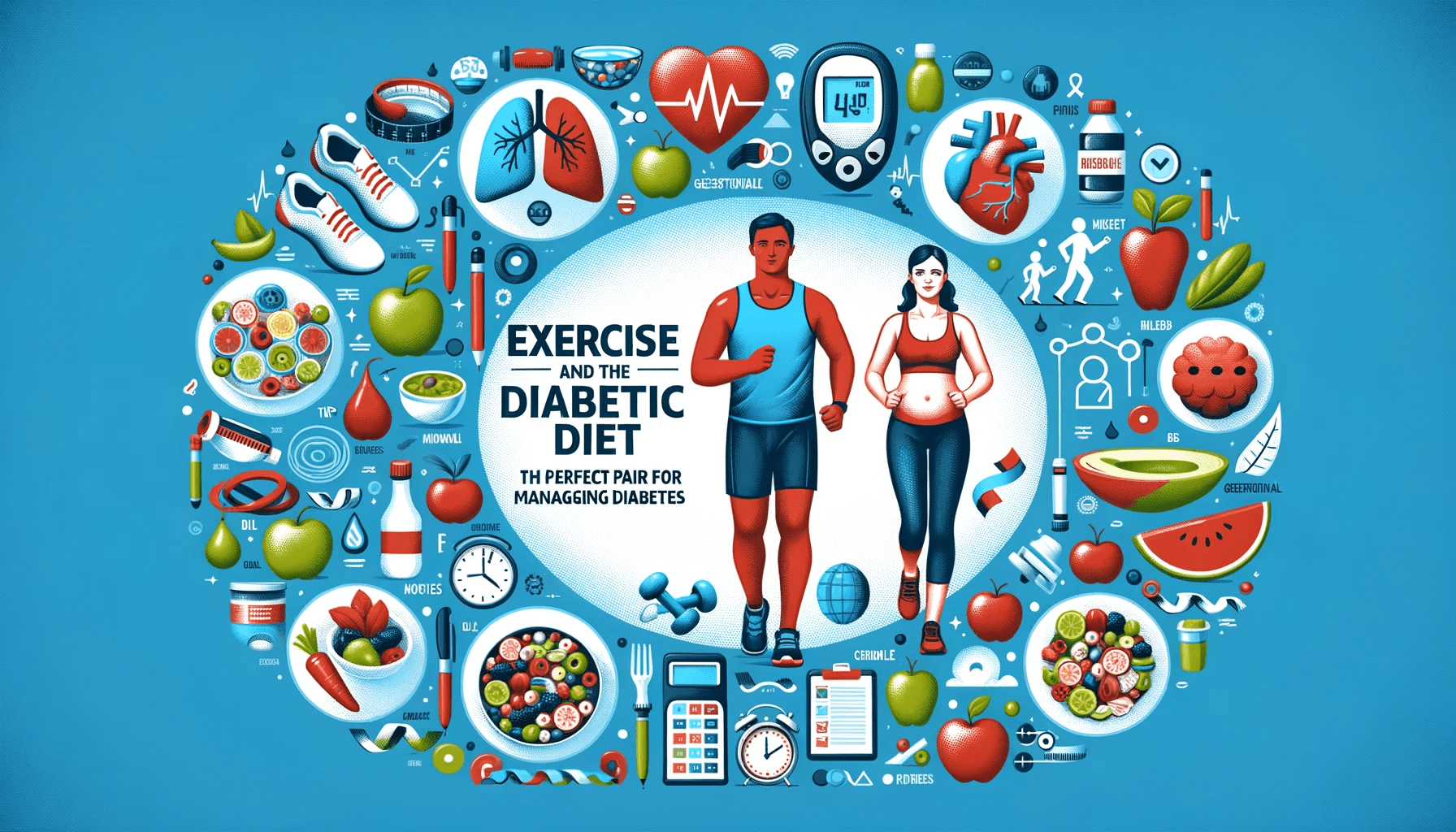
How Much Weight Do I Need to Lose?

Exercise and Diabetes




Weight Loss and Diabetes Management: The Ultimate Guide to How to Cure Diabetes
Weight Loss and Diabetes Management: This article provides a comprehensive overview of managing diabetes through weight loss. Topics covered include understanding the impact of diabetes on health, incorporating healthy eating habits, the importance of physical activity, medications and treatments, managing complications, psychological well-being, effective weight loss strategies, and making sustainable lifestyle changes. Find resources and further information for diabetes management and weight loss. Discover how How to Cure Diabetes can help you achieve your weight loss and diabetes management goals.
Understanding Weight Loss and Diabetes Management
Welcome to the first section of our comprehensive guide on weight loss and diabetes management. In this section, we'll explore the fundamental aspects of understanding how weight affects diabetes and the importance of managing your diabetes through weight loss.
What is Diabetes and How Does it Affect Your Health?
Diabetes is a chronic condition that affects the way your body regulates blood sugar levels. When you have diabetes, your body either doesn't produce enough insulin or can't effectively use the insulin it produces. This can lead to high blood sugar levels, which, over time, can result in serious health complications.
Diabetes can impact various aspects of your health, including your cardiovascular system, kidneys, eyes, oral health, and mental well-being. It's crucial to understand the implications of diabetes on your overall health and the importance of managing it effectively.
The Link Between Weight and Diabetes
There is a strong relationship between weight and diabetes. Excess body weight, especially around the waistline, increases the risk of developing type 2 diabetes. Additionally, for individuals already living with diabetes, maintaining a healthy weight is essential for optimal diabetes management.
Carrying excess weight can lead to insulin resistance, where the body's cells become less responsive to insulin. This can make it challenging to regulate blood sugar levels effectively. By addressing weight management, individuals can improve their body's insulin sensitivity and overall diabetes control.
How to Manage Your Diabetes Through Weight Loss
Managing diabetes through weight loss involves adopting a comprehensive approach that focuses on healthy eating habits, regular physical activity, medication management, and lifestyle changes.
Weight loss can lead to significant improvements in diabetes management, such as better blood sugar control, reduced medication needs, increased energy levels, and a lower risk of serious complications like heart disease and stroke.
To effectively manage your diabetes through weight loss, it's important to follow a sustainable and personalized meal plan that prioritizes nutritious foods. Consult a registered dietitian or diabetes educator to create a tailored eating plan that includes reducing sugar intake, increasing protein consumption, and emphasizing fruits and vegetables.
In addition to healthy eating, incorporating regular physical activity is crucial. Aim for at least 150 minutes of moderate-intensity physical activity per week, along with strength-training exercises. Physical activity helps with weight loss, improves insulin sensitivity, and overall diabetes control.
By implementing these strategies and making long-term lifestyle changes, individuals can successfully manage their diabetes through weight loss and improve their overall health and well-being.
Incorporating Healthy Eating Habits for Diabetes Management
In order to effectively manage diabetes, it is crucial to develop healthy eating habits that support blood sugar control and overall well-being. This section will explore the role of nutrition in diabetes control, provide guidance on creating a balanced meal plan specifically designed for diabetes, and offer insights into understanding food labels and making smart choices when it comes to food consumption.
The Role of Nutrition in Diabetes Control
Nutrition plays a vital role in the management of diabetes. It involves making conscious decisions about the types and quantities of food consumed to maintain stable blood sugar levels. A balanced diet rich in essential nutrients, such as fiber, healthy fats, and lean proteins, can help regulate blood sugar, reduce insulin resistance, and manage weight.
Creating a Balanced Meal Plan for Diabetes
When creating a meal plan for diabetes management, it is important to consider the overall composition of meals. Focus on incorporating a variety of fruits, vegetables, whole grains, and lean proteins. These food choices provide a wide range of essential nutrients while keeping blood sugar levels stable. Additionally, portion control is key to managing carbohydrate intake, as carbohydrates can significantly impact blood sugar levels.
- Increase consumption of non-starchy vegetables such as leafy greens, broccoli, and peppers.
- Choose whole grains like quinoa, brown rice, and whole-wheat bread instead of refined grains.
- Select lean sources of protein such as skinless poultry, fish, and legumes.
- Include healthy fats like avocados, nuts, and olive oil in moderate amounts.
Understanding Food Labels and Making Smart Choices
Properly understanding food labels can empower individuals with diabetes to make informed decisions about the products they consume. Pay attention to serving sizes, total carbohydrates, added sugars, and fiber content. Compare different options and choose products with lower sugar and higher fiber content. Additionally, limit the intake of processed foods and opt for whole, natural foods whenever possible.
- Read the ingredient list to identify hidden sources of added sugars or unhealthy fats.
- Choose unsweetened beverages like water, herbal tea, or flavored water with no added sugars instead of sugary drinks.
- Avoid highly processed foods and opt for fresh, whole foods whenever possible.
The Importance of Physical Activity in Weight Loss for Diabetes
Physical activity plays a crucial role in weight loss and diabetes management. Engaging in regular exercise offers numerous benefits that can help improve blood sugar control, reduce insulin resistance, and promote overall well-being.
Benefits of Exercise for Diabetes Management
Exercise provides several advantages for individuals with diabetes, including:
- Improved insulin sensitivity: Physical activity helps the body use insulin more efficiently, allowing for better blood sugar control.
- Weight management: Regular exercise aids in weight loss or weight maintenance, which is particularly essential for individuals with diabetes as excess weight can exacerbate insulin resistance.
- Cardiovascular health: Physical activity strengthens the heart and lowers the risk of cardiovascular diseases, such as heart attacks and strokes, which are common complications associated with diabetes.
- Stress reduction: Exercise is an effective way to manage stress levels, which can positively impact blood sugar levels and overall diabetes management.
- Improved overall fitness: Regular physical activity enhances overall fitness and boosts energy levels, making daily activities easier to accomplish.
Recommended Physical Activity Guidelines for Diabetic Individuals
It is recommended that individuals with diabetes engage in a combination of cardiovascular exercise and strength training to achieve optimal results:
Cardiovascular Exercise:
Cardiovascular exercises, also known as aerobic exercises, help improve heart health and burn calories. Aim for at least 150 minutes of moderate-intensity aerobic activity per week. Examples include:
- Brisk walking
- Cycling
- Swimming
- Dancing
- Aerobic classes
Strength Training:
Strength training exercises help build muscle and increase metabolism, leading to better weight management. Incorporate strength training exercises for all major muscle groups at least two days a week. Examples include:
- Weightlifting
- Resistance band exercises
- Bodyweight exercises (push-ups, squats, lunges)
Combining Cardiovascular Exercise and Strength Training for Optimal Results
A combination of cardiovascular exercise and strength training is highly effective for weight loss and diabetes management. Cardiovascular exercises improve heart health, while strength training helps build and maintain muscle mass, assisting in maintaining a healthy weight and improving insulin sensitivity.
Consider designing an exercise routine that includes a variety of activities to keep it interesting and engaging. Aim for regular exercise sessions, gradually increasing the intensity and duration as tolerated, and consult with a healthcare professional for personalized exercise recommendations.
Medications and Treatment Options for Diabetes Management
Medications and treatment options play a crucial role in the management of diabetes. There are several commonly prescribed medications that help control blood sugar levels and improve overall diabetes management.
Commonly Prescribed Medications for Diabetes
Common medications used for diabetes management include:
- Metformin: It is often the first-line medication prescribed to lower blood sugar levels and improve insulin sensitivity.
- Sulfonylureas: These medications stimulate the pancreas to produce more insulin.
- Thiazolidinediones: They help improve insulin sensitivity and reduce glucose production in the liver.
- DPP-4 inhibitors: They enhance the effects of incretin hormones, which help regulate blood sugar levels.
- SGLT-2 inhibitors: These medications lower blood sugar levels by increasing the excretion of glucose via urine.
Insulin Therapy and its Role in Diabetes Control
Insulin therapy is a crucial component of diabetes management, especially for individuals with type 1 diabetes and some individuals with type 2 diabetes. Insulin is a hormone that helps regulate blood sugar levels. It can be administered through injections or insulin pumps. The role of insulin therapy is to replace or supplement the body's insulin production and ensure adequate blood sugar control.
Other Treatment Options and Clinical Trials
In addition to medications and insulin therapy, there are other treatment options and ongoing clinical trials for diabetes management. These include:
- Incretin mimetics: These medications mimic the effects of incretin hormones and help regulate blood sugar levels.
- Bariatric surgery: It may be recommended for individuals with severe obesity and diabetes to achieve significant weight loss and improved diabetes control.
- Pancreas transplantation: In some cases, individuals with type 1 diabetes may undergo pancreas transplantation to restore insulin production.
- Clinical trials: Participating in clinical trials can provide access to innovative treatments and therapies that are being researched for diabetes management.
Managing Diabetes-Related Complications and Associated Risks
Managing diabetes-related complications is crucial for individuals with diabetes to maintain their overall health and well-being. This section explores various aspects of diabetes management related to heart health, eye and oral health, and other diabetes-related complications.
Heart Health and Diabetes Prevention
Diabetes significantly increases the risk of heart disease, so it is essential to prioritize heart health in diabetes management. Some key strategies for preventing heart disease include:
- Maintaining a healthy weight through a balanced diet and regular physical activity
- Managing blood pressure and cholesterol levels
- Quitting smoking and avoiding secondhand smoke
- Limiting alcohol consumption
Eye and Oral Health for Diabetic Individuals
Diabetes can also affect the eyes and oral health. Regular eye screenings and dental check-ups are crucial for early detection and prevention of complications. Some tips for maintaining good eye and oral health include:
- Controlling blood sugar levels to reduce the risk of diabetic retinopathy
- Practicing good oral hygiene, including regular brushing, flossing, and dental cleanings
- Informing eye care and dental professionals about your diabetes status
Kidney Disease and Other Diabetes-Related Complications
Diabetes can lead to kidney disease, nerve damage, foot problems, and other complications. To manage these risks effectively, it is important to:
- Monitor kidney function regularly through tests such as urine albumin and estimated glomerular filtration rate (eGFR)
- Control blood pressure and blood sugar levels to reduce the risk of kidney damage
- Take preventive measures to protect the feet, including proper foot care, regular check-ups, and wearing appropriate footwear
- Seek medical attention at the first sign of complications or abnormalities
By actively managing diabetes-related complications and associated risks, individuals can mitigate their impact on overall health and improve their quality of life.
Psychological Well-being and Support for Living with Diabetes
Mental Health and Diabetes Management
Living with diabetes can have a significant impact on one's mental well-being. The constant management, monitoring, and potential complications can lead to increased stress, anxiety, and even depression. It is crucial for individuals with diabetes to prioritize their mental health and seek support when needed. Regular communication with healthcare professionals, such as therapists or counselors, can help in managing the emotional challenges associated with diabetes. Additionally, incorporating stress management techniques like mindfulness, meditation, and engaging in hobbies can contribute to a better overall mental well-being.
Finding Support Groups and Resources for Diabetes
Connecting with others who share similar experiences can be invaluable for individuals living with diabetes. Support groups provide a safe space to discuss challenges, share coping strategies, and receive emotional support. There are various resources available, both online and offline, that can help individuals locate local support groups. Diabetes-specific organizations, community centers, and healthcare facilities often offer support group programs. Engaging with these groups can provide a sense of belonging and understanding, as well as valuable insights into managing diabetes effectively.
Coping Strategies and Self-Care Techniques for Diabetic Individuals
Managing diabetes requires a comprehensive approach that goes beyond physical health. Developing effective coping strategies can help individuals navigate the challenges that come with diabetes. This may include setting realistic goals, maintaining a positive mindset, and practicing self-compassion. Incorporating self-care techniques, such as engaging in hobbies, practicing relaxation techniques, and prioritizing leisure activities, can also contribute to overall well-being. It's important for individuals to listen to their bodies, identify their personal needs, and make time for activities that bring joy and fulfillment.
- Seek support from healthcare professionals
- Practice stress management techniques like mindfulness and meditation
- Engage in hobbies and activities that bring joy
- Connect with local support groups
- Utilize resources provided by diabetes organizations and healthcare facilities
- Set realistic goals and maintain a positive mindset
- Practice self-compassion and prioritize self-care
- Make time for leisure activities and relaxation
Weight Loss Strategies and Techniques for Long-Term Success
In order to achieve long-term success in weight loss and diabetes management, it is important to incorporate effective strategies and techniques. Here are some key areas to focus on:
Tips and Tricks for Effective Weight Loss
- Practice portion control: Measure your food to ensure you are eating appropriate portions.
- Avoid skipping meals: Eat regular meals and snacks throughout the day to keep your metabolism steady.
- Choose nutrient-dense foods: Opt for foods high in nutrients but low in calories, such as fruits, vegetables, lean proteins, and whole grains.
- Stay hydrated: Drink plenty of water to help you feel full and avoid overeating.
- Avoid sugary drinks: Limit your consumption of sugary beverages like soda and juice.
- Manage stress: Find healthy ways to cope with stress, as it can contribute to emotional eating.
Setting Realistic Goals and Tracking Your Progress
Setting realistic goals is essential for long-term success in weight loss and diabetes management. Here's how to do it:
- Set specific, measurable, achievable, relevant, and time-bound (SMART) goals.
- Break down your goals into smaller milestones to track your progress and stay motivated.
- Use a food diary or mobile app to keep track of your food intake and monitor your calorie consumption.
- Measure your physical activity using a pedometer or fitness tracker.
- Celebrate your achievements along the way to staying motivated.
Surgical Interventions for Severe Obesity and Diabetes Control
In cases of severe obesity and uncontrolled diabetes, surgical interventions may be considered. These procedures can significantly aid in weight loss and diabetes management.
- Gastric bypass surgery: This procedure involves creating a smaller stomach pouch and rerouting the digestive tract. It reduces the amount of food you can eat and bypasses a portion of the small intestine.
- Gastric banding: During this procedure, an adjustable band is placed around the upper part of the stomach to create a smaller stomach pouch. This limits the amount of food you can consume and helps you feel full sooner.
- Gastric sleeve surgery: Also known as sleeve gastrectomy, this procedure involves removing a portion of the stomach to create a smaller, banana-shaped stomach pouch.
- Biliopancreatic diversion with duodenal switch: This surgery involves removing a portion of the stomach, rerouting the small intestine, and creating a smaller stomach pouch. It allows for limited food intake and reduces nutrient absorption.
These surgical interventions should be considered only after consultation with a healthcare professional and in cases where other weight loss strategies have been ineffective or when there are significant health risks associated with obesity and diabetes.
Lifestyle Changes for Sustainable Weight Loss and Diabetes Management
In order to effectively manage weight loss and diabetes, incorporating sustainable lifestyle changes is essential. By making long-term adjustments to your daily routine, you can improve your overall health and well-being. This section explores three key aspects of lifestyle changes for sustainable weight loss and diabetes management.
Creating a Supportive Environment at Home and Work
A supportive environment plays a crucial role in maintaining a healthy lifestyle. At home, surround yourself with nutritious food options and remove any temptations that may hinder your progress. Stock your pantry with whole grains, lean proteins, and fresh fruits and vegetables. Additionally, communicate your goals and seek support from your loved ones, as their encouragement can greatly impact your journey.
In the workplace, establish healthy habits by packing your own nutritious meals and snacks, rather than relying on cafeteria or vending machine options. Make time for physical activity during breaks, such as taking a walk or stretching. Creating a positive work-life balance can also help reduce stress levels, which is beneficial for both weight loss and diabetes management.
Sleep, Stress Management, and their Impact on Diabetes Control
Adequate sleep and effective stress management are essential components of weight loss and diabetes management. Lack of sleep can disrupt hormone levels, leading to increased appetite and cravings. Aim for 7-8 hours of quality sleep each night to support overall health and well-being.
Stress management techniques, such as deep breathing exercises, meditation, or engaging in activities you enjoy, can help regulate stress hormones and prevent emotional eating. By incorporating stress-reducing activities into your daily routine, you can better manage your diabetes and improve weight loss outcomes.
Making Long-Term Lifestyle Changes for Better Health and Well-being
When it comes to sustainable weight loss and diabetes management, it's important to focus on long-term lifestyle changes rather than short-term fixes. This includes developing healthier eating habits, engaging in regular physical activity, and adopting stress management techniques as part of your daily routine.
Choose nutrient-dense foods that support diabetes control, such as fresh fruits and vegetables, whole grains, lean proteins, and healthy fats. Incorporate regular exercise into your week, aiming for at least 150 minutes of moderate-intensity aerobic activity, along with strength training exercises two or more times a week.
Remember, sustainable weight loss and diabetes management are achieved through consistent, healthy habits that become a part of your everyday life. By making these long-term lifestyle changes, you can improve your overall health, successfully manage your diabetes, and maintain a healthy weight.
Resources and Further Information for Diabetes Management and Weight Loss
When it comes to managing diabetes and achieving weight loss goals, there are various resources and sources of information available that can provide valuable support and assistance. Here are some recommended resources to help you on your journey:
- National Institute of Diabetes and Digestive and Kidney Diseases (NIDDK): NIDDK offers a wide range of educational materials, research updates, and resources on diabetes management and weight loss. Their website provides valuable information on nutrition, physical activity, medications, and more.
- American Diabetes Association (ADA): ADA is a leading organization focused on diabetes research, advocacy, and support. They offer educational resources, guidelines for healthy living, and access to trained professionals who can provide personalized guidance on weight loss and diabetes management.
- Centers for Disease Control and Prevention (CDC): CDC offers comprehensive information on diabetes prevention and management. Their website provides resources for healthy eating, physical activity, and tips for successful weight loss.
- Diabetes Support Groups: Joining a diabetes support group can provide valuable emotional support, practical advice, and a sense of community. These groups offer opportunities to connect with others living with diabetes and share experiences and strategies for managing weight and diabetes.
- Community Health Centers: Local community health centers often provide resources and programs dedicated to diabetes management and weight loss. They may offer educational classes, support groups, and access to healthcare professionals who specialize in diabetes care.
- Dietitians and Certified Diabetes Educators: Consulting with a registered dietitian or a certified diabetes educator can be extremely beneficial when it comes to creating a personalized meal plan, understanding nutrition labels, and developing effective strategies for weight loss and diabetes management.
- Online Communities and Forums: There are numerous online communities and forums where individuals can share their weight loss and diabetes management journeys. These platforms can provide a wealth of information, support, and motivation from people who have faced similar challenges.
Remember, it's important to consult with your healthcare team to discuss the resources and information that best align with your specific needs and goals. They can provide guidance on reputable sources and additional resources specific to your situation. Take advantage of these resources and continue to educate yourself on effective strategies for weight loss and diabetes management.
✨ Other articles you might be interested in:
